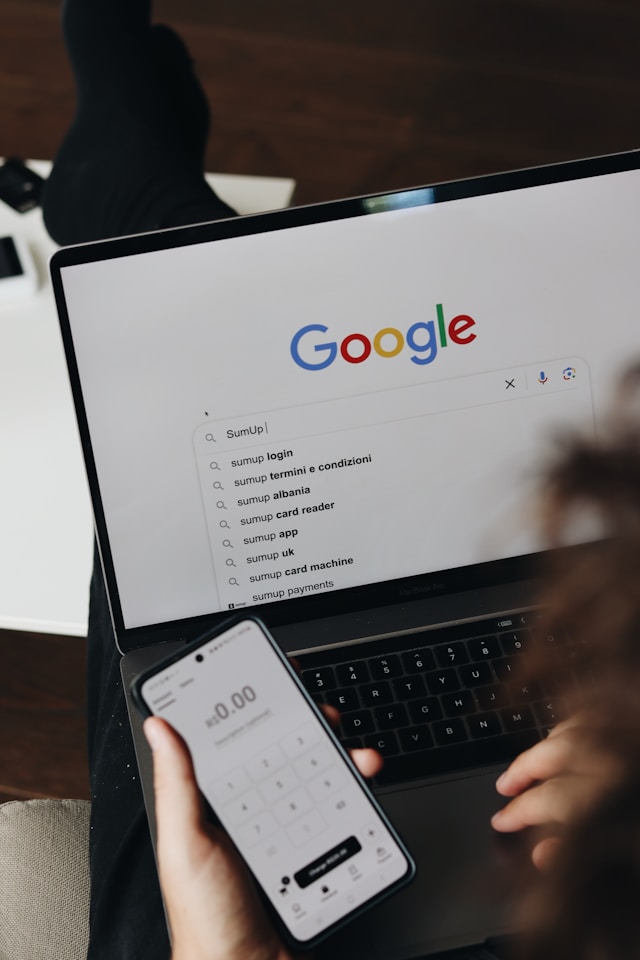For brick-and-mortar businesses, standing out in local search results can make the difference between a busy shopfront and an empty one. Local SEO is all about improving your visibility to nearby customers who are actively searching for the products or services you provide.
From setting up a Google Business Profile to gathering customer reviews and building local citations, every element works together to boost your chances of appearing in front of the right audience at the right time. Done well, local SEO not only improves your rankings but also builds trust, drives footfall, and strengthens your reputation in the community.

What is a Google Business Profile, and why is it important?
A Google Business Profile (formerly Google My Business) is a free tool that allows businesses to manage their online presence across Google Search and Google Maps. It displays key information about your business, such as your address, phone number, opening hours, and customer reviews. Creating and optimising your Google Business Profile is arguably the single most important step for any brick-and-mortar business looking to improve its local SEO.
The profile is crucial because it allows your business to appear in the ‘Local Pack’ on the search results page, which is a prime piece of real estate that shows the top three local businesses that are most relevant to a user’s search query. A complete and up-to-date profile helps Google understand where your business is located and what it does, thereby increasing your chances of appearing in these prominent local search results and driving local customers to your door.
How do customer reviews affect my local SEO?
Customer reviews are a vital component of local SEO. They act as a powerful form of social proof, with a high volume of positive reviews signalling to both potential customers and search engines that your business is trustworthy and provides a good service. Search engines use the quality and quantity of your reviews as a ranking factor for local search, so actively encouraging happy customers to leave feedback can directly improve your visibility.
Beyond search rankings, a strong review profile can significantly influence a customer’s decision to visit your business. People often read reviews before making a purchase or choosing a service provider. Responding to both positive and negative reviews shows that you are engaged with your customers and care about their experience, which can further enhance your local reputation and build trust in your brand.


What is a local citation?
A local citation is any online mention of your business’s name, address, and phone number (NAP), typically without a link to your website. These citations can be found on business directories like Yelp, local chamber of commerce websites, or industry-specific listing sites. While a citation may not provide a direct link, it is a crucial signal to search engines that your business is legitimate and has a physical presence.
Building a consistent profile of local citations is a key local SEO strategy. It helps to reinforce your business’s location and contact details, which in turn helps search engines to verify your information. Inconsistent NAP data across different directories can confuse search engines and harm your local rankings. An SEO consultant can help ensure your information is accurate and consistent everywhere, which is essential for a strong local presence.
How do I optimise my website for local keywords?
Optimising your website for local keywords involves tailoring your content to reflect your geographical area. A common mistake is to create generic content that doesn’t mention your location. To optimise, you should include your city, county, and region on your home page, ‘about us’ page, and contact page. You can also create dedicated service or product pages that are specifically optimised for a particular location, such as ‘gardeners in Manchester’ or ‘pizza delivery in Leeds’.
Furthermore, you should ensure that your website’s contact page has a clear and easy-to-read embed of a Google Map showing your location. It is also important to use location-specific keywords in your meta titles and descriptions, as this can increase your click-through rate from local search results. By integrating these local signals, you can increase your chances of being found by people searching for your services in your area.


What are the most important ranking factors for local SEO?
The most important ranking factors for local SEO are proximity, relevance, and prominence. Proximity is a key factor as Google will always prioritise businesses that are physically closest to the searcher’s location. Relevance is a measure of how well your business and its services match the user’s search query. This is where optimising your Google Business Profile and website content with relevant keywords comes into play.
Prominence refers to how well-known or authoritative your business is in its local area. This is a measure of your business’s overall reputation, both online and offline. Prominence is built through a number of factors, including a high number of positive reviews, a strong backlink profile, and a high volume of local citations. A business with strong prominence is more likely to appear in the Local Pack, even if it is not the closest option.
How does an SEO consultant help with on-page local SEO?
An SEO consultant helps with on-page local SEO by ensuring that your website’s content and structure are perfectly optimised to attract local customers. They will start by conducting local keyword research to identify the specific terms people in your area are using to find your products or services. They will then help you strategically integrate these keywords into your website’s copy, URLs, headings, and meta descriptions.
A consultant will also ensure that your website has a dedicated, well-optimised contact page that includes your full Name, Address, and Phone number (NAP), and is marked up with Local Business Schema. They can also provide guidance on creating local landing pages for different services or locations, which is a highly effective way to expand your local SEO footprint. This detailed approach ensures your website is a powerful asset in your local marketing efforts.


Can I do local SEO if I don’t have a physical storefront?
Yes, you can do local SEO even if you don’t have a physical storefront, as long as you serve customers in a specific geographical area. Businesses that operate this way are often called ‘service-area businesses’ and include plumbers, electricians, and mobile dog groomers. The key is to set up your Google Business Profile correctly by specifying a service area rather than a physical address.
You can still use local keywords on your website and build local citations. Your website’s content can focus on the areas you serve, such as ‘plumber in Surrey’ or ‘electrician in Kent’. It is important not to create a fake physical address, as this can lead to a penalty from Google. By following these guidelines, you can effectively market your service to a local audience without a brick-and-mortar location.
What is a geo-modified keyword?
A geo-modified keyword is a search term that includes a geographical location. Examples include ‘coffee shop Manchester’, ‘plumber near me’, or ‘dentist in Glasgow’. These keywords are fundamental to local SEO because they signal a user’s intent to find a business or service in a specific area. Optimising your website for these terms is crucial for attracting local traffic.
An SEO consultant will conduct research to identify the most relevant geo-modified keywords for your business and will ensure they are used in your website’s content, titles, and meta descriptions. This helps search engines understand that your business is relevant to searches in a particular location. By creating content that is tailored to your specific service area, you can significantly increase your local search visibility.


How does a business handle multiple physical locations with local SEO?
For businesses with multiple physical locations, local SEO becomes more complex but also presents a great opportunity. The most important step is to create a unique and optimised Google Business Profile for each individual location. Each profile should have its own set of accurate NAP data, reviews, and photos, and should be properly categorised.
Additionally, you should create a separate, unique landing page on your website for each physical location. Each page should be fully optimised for the specific location, with unique content, local keywords, and a clear call to action. It is important to avoid duplicating content across these pages. By giving each location its own dedicated SEO treatment, you can maximise your visibility in local search results across all of your branches.
What are some common local SEO mistakes to avoid?
One of the most common local SEO mistakes is having inconsistent NAP (Name, Address, Phone number) data across different online directories. Even a small discrepancy, like a different street abbreviation or phone number format, can confuse search engines and harm your local ranking. Another mistake is failing to claim and fully optimise your Google Business Profile.
Failing to respond to customer reviews, both positive and negative, is also a common error that can damage your local reputation. Another significant mistake is to create duplicate location pages on your website with identical content, which can lead to a Google penalty. By avoiding these common pitfalls and maintaining a consistent and professional local presence, you can ensure that your local SEO strategy is successful.


